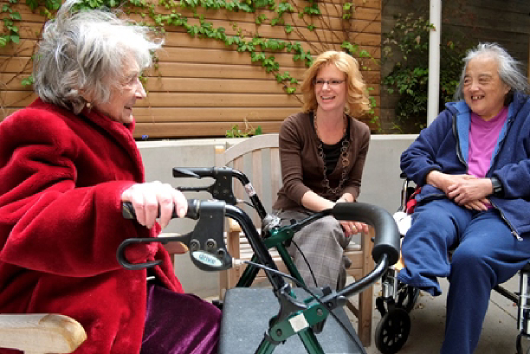About

In 1977, the Directors of Pennsylvania’s Area Agencies on Aging (AAAs) joined together in creating a statewide organization to represent their collective interests and strengthen their professional role within the Aging Network. Today this organization, incorporated as the Pennsylvania Association of Area Agencies on Aging (P4A), has come to represent both the best interests of older Pennsylvanians and its AAA Membership by fostering collaboration in areas of:
- Advocacy
-
Leadership
-
Training
-
Policy
The association provides Pennsylvania’s 52 AAAs the opportunity to have direct input into broad issues of statewide and national significance while remaining responsive to the character and unique needs of each local community. In this way, the association’s members benefit from the knowledge and capabilities of others throughout the Commonwealth – allowing them to improve quality standards and procedures reflecting contemporary thinking and demonstrated best practice.
Our Mission Statement
To represent and strengthen the role and professional interests of Area Agencies on Aging, promote excellence in the development and provision of community-based services for older adults, and represent the special needs and interests of Older Pennsylvanians through coordinated and collaborative efforts, including advocating for appropriate legislation, influencing policy development, and developing professional standards.
Our Organizational Principles
1. Think, speak, and act from a positive place.
Your thoughts form the foundation for what you say, and what you say influences what you do. When thoughts are negative, it becomes easier to say negative things, which makes it easier to act in negative ways. And negativity is not conducive to productive problem-solving, constructive relationships, or reaching the desired outcome.
2. Recognize "we" is stronger than "I."
P4A is a team effort. The collective efforts of the team are much more powerful than any individual alone. "We" means you share your knowledge, expertise, and skills, so our collective strength increases.
3. Know why you do what you do.
Be clear about the actions you take and how they help reach desired outcomes that ultimately benefit the aging network and those the network serves. You need to know why you are doing something. Ask what purpose does this serve?
4. Be open to multiple possibilities.
There is almost always more than one solution to an issue. If one path does not lead to the desired outcome, another one will. Keep searching for a great solution until you find it.
5. Practice no-blame problem-solving.
How a situation came to be or who was involved in it is much less important than finding solutions. P4A does not blame others or throw anyone under the bus.
6. Listen to understand.
Be generous with your listening. People need to feel heard and understood. When you listen to understand, you build stronger relationships because you more fully understand the other person's ideas, situation, or concern.
7. Speak truthfully, yet kindly.
Do not steer clear of the truth when it could be unpopular or uncomfortable. Have difficult conversations from a place of kindness, thoughtfulness, and respect. Words can hurt. Use words that do not attack, insult, or diminish others.
8. Recognize, affirm, and support the good efforts and work of others.
The relationships you have with others grow stronger when you acknowledge their efforts and work. Even if the work falls short of an ideal, acknowledging the effort makes it easier to work together now and in the future.
9. Be clear about the expectation of continued improvement.
Perfection is an elusive goal, and some people are so concerned with it that they lose sight of the bigger picture. They focus on making sure to cross every "T" and dot every "I." Consistently working on improving what you do makes more sense. Sometimes crossing every "T" and dotting every "I" is not as important as the bigger picture.
10. Ask for what you need.
There will be times when you need support, ideas, feedback, a safe place to vent, and 1,000 other things. You function better when you ask for what you need.
11. Leave your ego at the door.
It's not about you. It's always about the bigger picture. We are here to accomplish things that benefit others, not ourselves.
12. Keep commitments.
Keeping commitments is, in practice, what others come to see as us keeping our word. When we keep commitments, we show others that they can trust our word.
